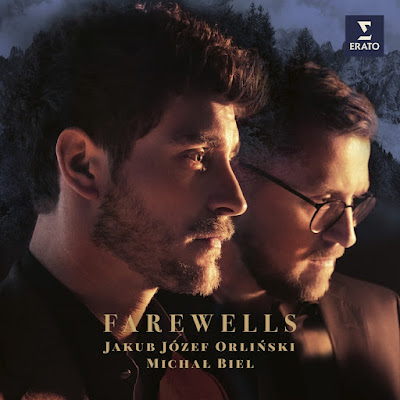This week, counter-tenor Jakub Józef Orliński's new album is out on Erato. Having recorded albums of (often rare) Baroque repertoire, he has moved in a different direction. Along with pianist Michał Biel, Orliński has recorded Farewells, a disc of songs by Polish composers from Moniuszko right through to the contemporary. This is repertoire which is woefully addressed in the concert hall and Farewells reveals a fascinating repertory that few will be familiar with.
On Saturday, Jakub Józef Orliński and Michał Biel performed a selection of songs from the disc at the Polish Hearth Club in South Kensington, and also talked about their musical partnership and exploring Polish music.
We began with a song from Henryk Czyż (1923-2003) whose centenary occurs next year. We heard a song from his Farewells which gives the album its name; a lyrically melancholy, almost bluesy number that seemed capture a number of interesting influences. Then a group of songs Mieczysław Karłowicz (1876-1909), these were often tiny but intense and the spirit of Tchaikovsky (whose music Karłowicz admired) seemed to be close by, though there was something rather French about some. Then a song by Stanisław Moniuszko (1819-1872), best known for his operas Halka and The Haunted Manor (though he actually wrote nine complete operas, with five more incomplete). His song writing revealed a very distinctive voice, full of plangent melancholy. We ended in the modern day with the stunning Autumn by Paweł Łukaszewski.This was only a taster of the complete album, but it made you wonder why we don't know this music more. The idea for the programme has been bubbling under for some years, and Orliński explained how he and Biel had been trying out Polish songs in recital and getting good reactions from the audience. The recording actually came about partly because in September last year, both performers found themselves with gaps in their diaries and decided to go for it.
But the planning had been unfolding, and Orliński had sung songs by Tadeusz Baird as a student. Orliński and Biel knew each other as students in Warsaw and subsequently were both at the Juilliard together. There Biel suggested other Polish songs to Orliński (who admits that he was not always on board with the songs initially), for instance, Karol Szymanowski's folk-inspired songs whilst Henryk Czyż songs are much more often song by lower voices and using a counter-tenor sheds a new light on them.
Part of their reason for performing and recording the songs was the sheer beauty of the music and the fact that this repertoire is under represented on world stages. As regards the language, a number of people during the evening commented that Czech has become relatively common in the concert hall and opera house, so there is no reason why Polish should not.
This was all contrary to Orliński's initial ideas about his career, as he had assumed he would be performing Baroque music and opera. He started out as a counter-tenor almost by accident. He sang as a child in an amateur choir and when his voice broke he joined a vocal ensemble of men's voices that performed Renaissance music. He was singing bass-baritone, but the ensemble decided they needed some altos and the two youngest members (Orliński and his friend Piotr) were deputed to sing alto, which led to him experimenting and exploring, listening to the Kings Singers and dreaming that maybe one day he might be good enough to join them (and in fact he was recorded with them).
Further information about Farewells from Warner Classics.


.jpg)






%20Craig%20Fuller.jpg)


No comments:
Post a Comment